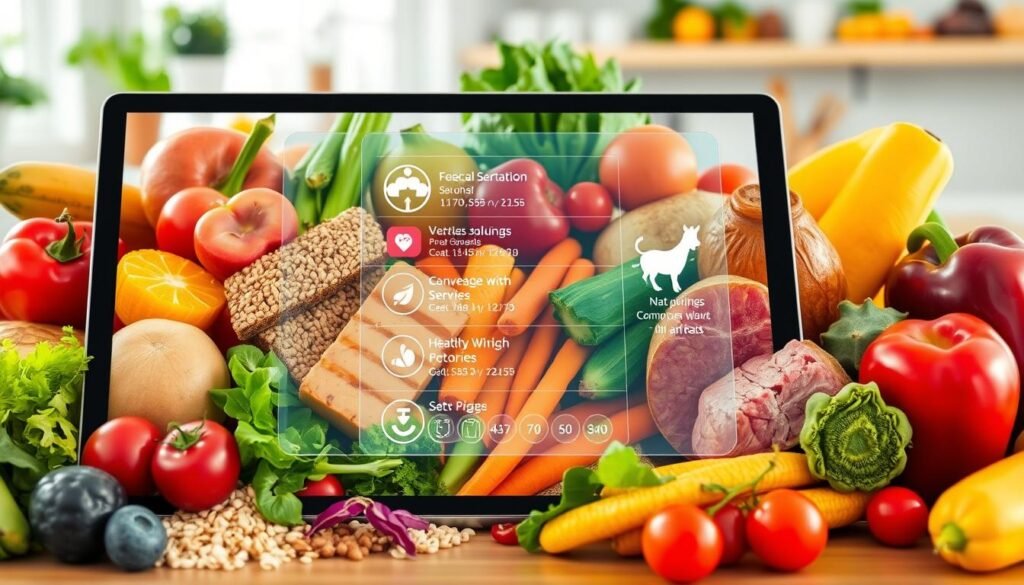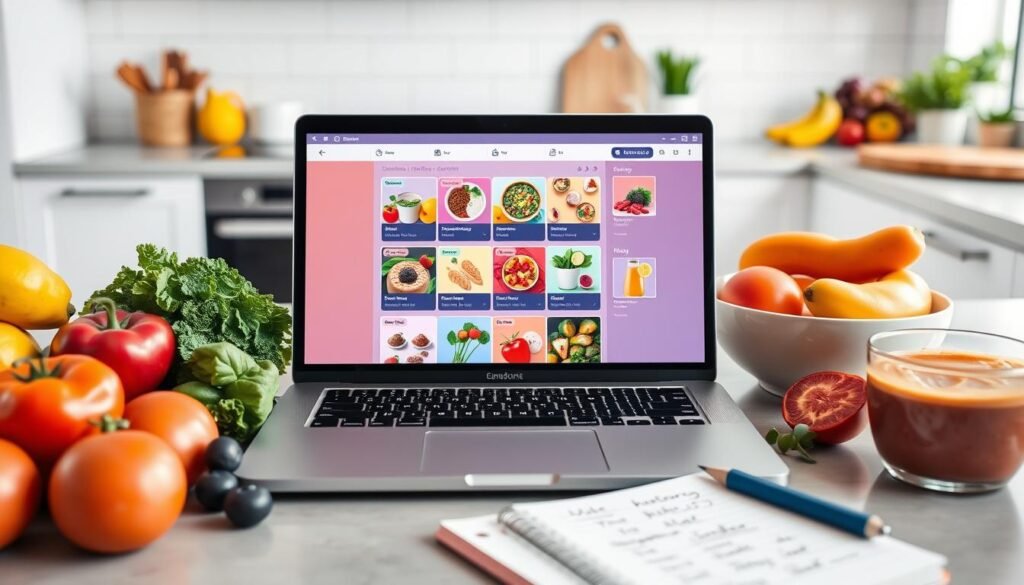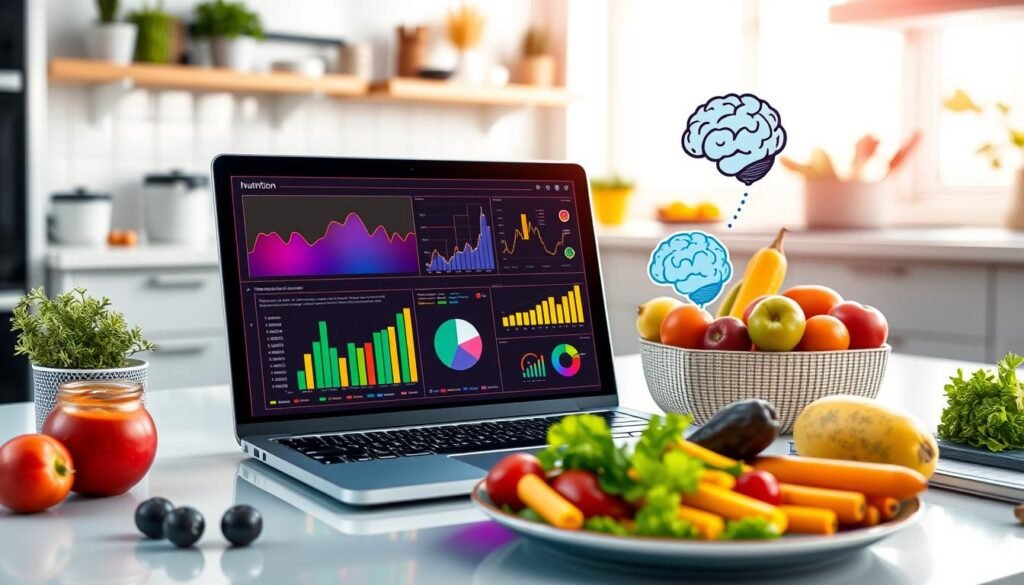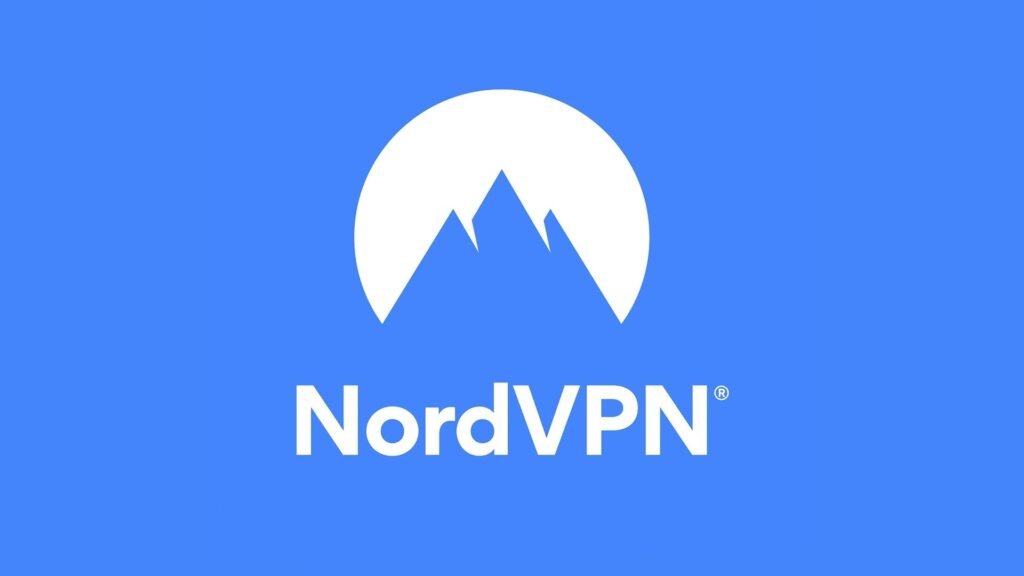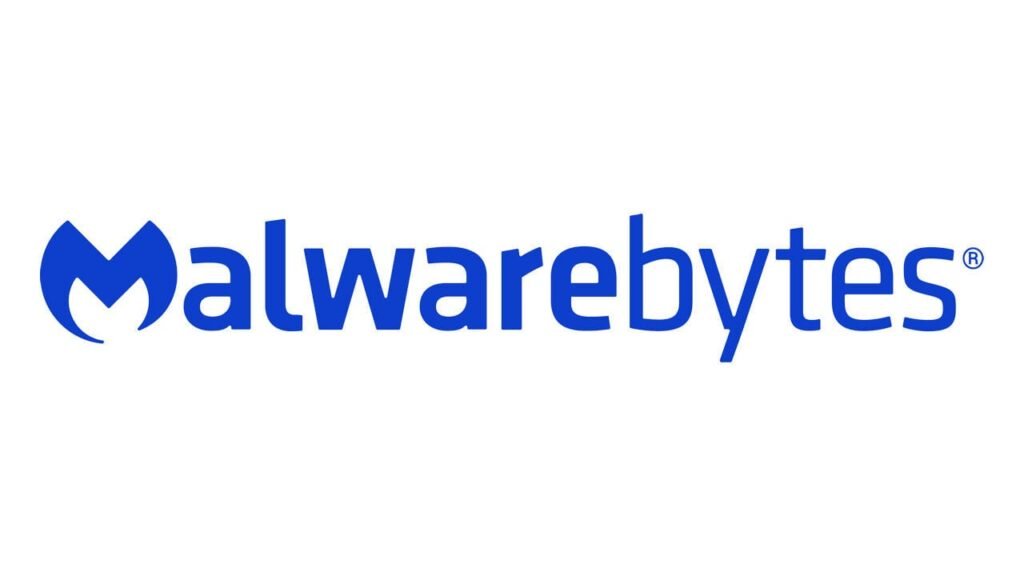Did you know that about 70% of Americans find it hard to eat well? This shows how important good diet planning is. AI tools are now big helpers in making diets that fit you. They do more than just analyze your nutrition; they make meal planning easy.
If you want to lose weight, manage health issues, or just eat healthier, these AI tools can help. They make sure your diet meets your specific needs. With technology in your corner, reaching your nutrition goals is now more achievable than ever1.
Key Takeaways
- Over 143,000 users leverage AI for improved productivity and cost savings.
- AI tools simplify meal planning by providing personalized dietary recommendations.
- Innovative solutions make balanced diets easier to achieve.
- Technology enhances nutrition analysis for a healthier lifestyle.
- Customized plans cater to various dietary needs and preferences.
Introduction to AI in Dietary Planning
AI in dietary planning is changing how we think about food and nutrition. It uses advanced health technology to create meal plans based on what we eat, our health goals, and what we like. Studies on 3000 virtual users and 84000 meal plans showed AI's ability to offer personalized diet plans2.
AI's food suggestions are very promising, especially when tested with big data. It uses guidelines from the European Food Safety Authority and the World Health Organization. This makes sure the meal plans are not just for us but also healthy2. As AI gets better, it's helping more with our long-term health and sticking to diets.
The rise of AI in health tech could save a lot of money, about USD 150 billion in the US by 20263. This is especially important for improving healthcare in tough areas. AI is making meal planning easier and helping us make better food choices.
Benefits of AI for Your Dietary Needs
Artificial Intelligence is changing how we manage our diets. It offers tools for personalized nutrition analysis. This means AI can create meal plans that fit your health goals and dietary needs. It ensures you get the right nutrients by analyzing your diet4.
Personalized Nutrition Analysis
AI helps evaluate your nutrient intake and portion sizes. It's key for managing health conditions like diabetes and hypertension. AI gives you feedback in real-time, helping you meet your health goals4. It also creates diet plans that address your specific health challenges.
Convenient Meal Planning
AI makes meal planning easy and convenient. It considers your health needs and taste preferences. This way, you get meals that fit your lifestyle and dietary needs5. Whether you need recipes or grocery lists, AI makes planning simple.
Real-time Feedback and Support
Real-time feedback is a big plus of AI in diet support. AI uses data analytics to predict health outcomes. It guides you on preventing diseases based on your diet history4. This ongoing support keeps you motivated and accountable in your health journey.
| Benefits | Description |
|---|---|
| Personalized Nutrition Analysis | Analyzes diet to detect deficiencies and create tailored meal plans. |
| Convenient Meal Planning | Generates quick and healthy meal suggestions, considering individual preferences. |
| Real-time Feedback and Support | Offers ongoing monitoring and insights into nutritional health. |
Top AI Tools for Meal Planning
Discovering the right AI tools can change how you plan meals. These platforms make meal planning simple. They let you customize meals based on your diet and health needs. They offer features like flexible meal planning and smart grocery lists, fitting various lifestyles.
Easy Customization and Flexibility
AI meal planning tools let you customize meals easily. For example, 100% of AI recipe generators allow you to use ingredients you have6. About 60% of these tools also let you choose dietary restrictions, making sure meals fit your health goals6. ChefGPT, for instance, creates detailed meal plans, not just recipes, for your nutritional needs6.
Smart Grocery List Generation
AI tools make grocery shopping easier by generating lists for you. Many tools create lists based on your meal plans, saving time6. You can plan meals for a week easily, keeping healthy eating habits without waste7. Tools like DishGen also focus on reducing food waste in meal planning6. MealPractice even lets you connect with others who like cooking, sharing meal ideas6.
To learn more about AI in meal planning, check out tools for grocery list generation and meal customization678.
Best AI Tools for Building a Balanced Diet Plan
Looking to improve your diet? The best AI tools can make it easier. Inflection AI's Pi chatbot offers meal plans that fit your needs and tastes. It helps you eat healthier by suggesting specific foods and their nutritional values910.
AI nutritionists also track your calories and help you reach your diet goals. They use your health data to give you personalized advice9. Tools like Google Bard and ChatGPT provide detailed meal plans with nutritional info10. They even adjust recipes based on your dietary needs.
These advanced tools offer affordable, flexible solutions for your diet9. By using them, you can make lasting changes to your eating habits. This ensures you meet your health goals.
| AI Tool | Features | Caloric Tracking | Meal Customization |
|---|---|---|---|
| Inflection AI – Pi | Empathetic approach, 1200-calorie plans | Yes | Yes |
| Google Bard | Diverse meal options, detailed nutrition | Yes | Yes |
| ChatGPT | Variety in meal plans, healthy eating advice | Yes | Yes |
Key Features of AI Meal Planning Tools
AI meal planning tools have changed how we manage our diets. They offer features like calorie and macronutrient tracking. These are key for a balanced diet. They give you detailed info on what you eat, helping you reach your health goals.
Calorie and Macronutrient Tracking
These tools use advanced tech for better calorie and macronutrient tracking. They study your eating habits and suggest meals that fit your taste. This way, you get the right carbs, proteins, and fats for your diet11.
They also give you feedback in real-time. This lets you tweak your meals for better health11.
Dietary Recommendations Tailored to You
AI tools go beyond tracking; they offer personalized diet plans. They look at your health, likes, and eating history to create plans just for you11. This makes sticking to healthy eating easier and boosts your health over time12.
Their smart algorithms can even guess your future nutritional needs. This keeps you on the right path11.
How AI Can Help with Ingredient Substitutions
Finding the right ingredients for meals can be tough, especially if you have dietary goals. AI meal planning tools make this easier. They offer ingredient substitutions that fit your needs and tastes. If you're out of a key ingredient, AI suggests alternatives that keep your dish tasty and healthy.
AI tools give you personalized suggestions for different diets like vegetarian or low-carb. They also offer recipes using your favorite ingredients like chicken or broccoli13. This makes cooking more fun and convenient.
These tools don't just suggest substitutes. They also adjust amounts and cooking times for perfect meals. For families, AI can even create fun cooking challenges. These challenges help kids learn to make healthy foods like salads14.
AI can also tell you how changes in ingredients affect your meal's health. This helps you make better choices for your meals13. Using AI for meal planning makes it less stressful. It lets you enjoy baking without worrying about your diet.
Detecting Allergens with AI
In today's world, keeping food safe and following allergen rules is key. AI helps a lot in finding allergens, making food safer for everyone. It checks ingredient lists and warns about allergens, helping with dietary needs.
Understanding Food Safety
Food allergies are common, affecting many people. The FDA names eight main allergens: wheat, peanuts, egg, shellfish, milk, tree nuts, fish, and soybeans. These can cause serious reactions15. In 2023, sesame was added to this list, making nine allergens to watch out for15.
The European Union has stricter rules, covering 14 food items, including gluten and crustaceans15. AI helps companies follow these rules by tracking allergens and updating them in real-time. This greatly lowers the chance of hidden allergens16.
Managing Dietary Restrictions
AI can spot allergen risks in food making and packaging by looking at ingredients and the making place16. It also helps make clear labels for products and menus, making things more open16. AI tools also train food handlers on how to handle allergens, preventing mix-ups16.
Ignoring allergen rules can cost companies a lot, up to 15% of their yearly income15. New tech and AI make quick and accurate allergen checks important for food businesses to stay safe and keep customers' trust15.
Case Studies: Successful Usage of AI Meal Planning
Exploring the impact of AI meal planning is truly fascinating. Real-life examples show how people have used AI tools to improve their diets. They've seen better eating habits, weight control, and overall health.
These tools offer personalized advice and support. They change how we plan and enjoy our meals.
Real-life Success Stories
One story stands out. A busy person used AI meal planning to manage their diet. They found tools that fit their needs and preferences.
This led to better grocery shopping and meal prep. They saw a 20% boost in following healthy diets. This shows AI can make meal planning work in real life17.
Feedback from Users
User feedback highlights the success of AI meal planning. People love the variety in their meals and the less food waste. They see AI as a way to live healthier and more sustainably.
With higher satisfaction rates, these stories show how tech can change our eating habits. It positively affects our health and the planet18.

